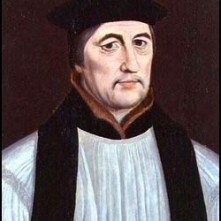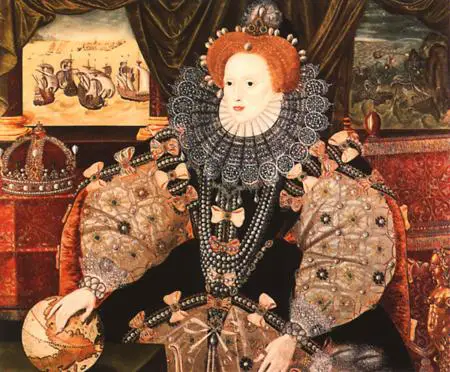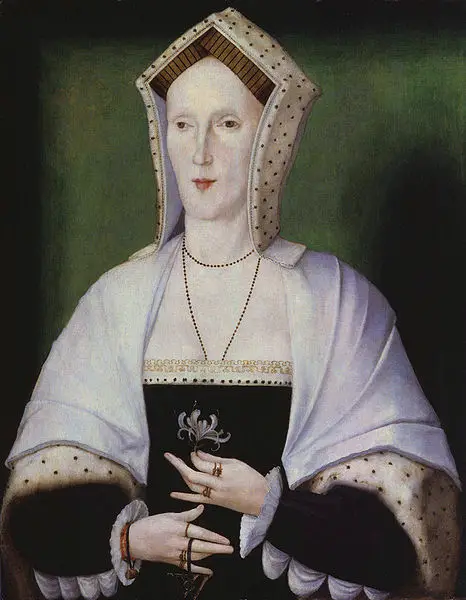17 August
1498 – Death of John Scrope, 5th Baron Scrope of Bolton. It is likely that the Yorkist Scrope fought on Richard III's side at the Battle of Bosworth in 1485, but escaped punishment by the victor, Henry VII. He was imprisoned in 1487 after supporting the pretender Lambert Simnel, but was released, and by 1492 was loyal to Henry VII.1510 - Henry VII's chief administrators, Sir Edmund Dudley and Sir Richard Empson, were beheaded on Tower Hill after being found guilty of treason. See 18 July 1509 - Edmund Dudley convicted of treason for more on this.
1517 – Death of Andreas Ammonius (also known as Andrea Ammonio and Andrea della Rena), the Italian humanist scholar, cleric and poet, from sweating sickness during the night of the 17th/18th. He died in London and was buried at St Stephen's, Westminster. He served Henry VIII as Latin Secretary and received various church offices, including the Canonry and Prebendary of St Stephen's, Westminster. Ammonius also served the papacy as sub-collector of taxes in England.
1545 – Death of Thomas Poynings, 1st Baron Poynings, of dysentery while serving Henry VIII as Lieutenant of Boulogne.
18 August
1536 – Baptism of William Borough, explorer and naval officer, at St Mary's in Northam, Devon. Borough served Elizabeth I as Comptroller of the Queen's Ships.1562 – Death of John Mordaunt, 1st Baron Mordaunt of Turvey, politician, peer and member of Henry VIII's council. He died at his home at Turvey, in Bedfordshire, and was buried in the church there.
1572 – Marriage of Henry III, King of Navarre (future Henry IV of France), and Margaret of Valois at Notre Dame Cathedral in Paris. The aim of the marriage was to unite the Bourbon and Valois families, and also to bring peace between the Catholics and Huguenots. The St Bartholomew’s Day Massacre of the Huguenots took place just six days after the wedding.
1587 - The first European Christian was born in the New World. Virginia Dare was the daughter of Ananias Dare and his wife, Eleanor, daughter of Governor John White. She was born in the Roanoke colony, in what is now North Carolina, just days after the arrival of the colonists on Roanoke Island. Virginia was baptised the following Sunday.
19 August
1531 – Burning of Thomas Bilney, Protestant martyr, at Lollard's Pit, just outside Bishopsgate. Although he was burned as a heretic, he actually denied his reformist views and affirmed his Catholic faith at his execution.1561 - At six o'clock in the morning, Mary, Queen of Scots landed at Leith harbour, in Scotland, the country of her birth. The reason for her return to her homeland was the death of her husband, Francis II, King of France.
1578 – Death of John Harpsfield, humanist, scholar and Roman Catholic priest, in London. He was buried in St Sepulchre Church, London. Harpsfield is known for his leading role in the Marian persecutions of Protestants and his nine sermons, which appear in Edmund Bonner's 1555 “Homilies”.
1591 – Death of Welsh clergyman and Bible translator Thomas Huet at Tŷ Mawr, Llysdinam, Brecknockshire. He was buried in the chancel of Llanafan Fawr church. Huet helped Richard Davies and William Salesbury translate the “New Testament” into Welsh in 1567.
1601 – Death of William Lambarde, writer, antiquary and lawyer, at Westcombe in East Greenwich. He was buried in St Alphege Church, East Greenwich, but in 1710 his monument was moved to the Lambarde chapel in St Nicholas's Church, Sevenoaks. Lambarde's works included his 1570 “Perambulation of Kent”, the 1581 “Eirenarcha: or of the Office of the Justices of Peace” and the 1591 “Archeion, or, A Discourse Upon the High Courts of Justice in England”.
20 August
1509 – Birth of Sir William Stanford (Staunford), judge and legal writer. Stanford served Mary I as one of her queen's Sergeants, and is known for his legal books, “Les plees del coron” (1557), on criminal law, and “Exposicion of the Kinges Prerogative” (1567)1580 – Death of Sir George Bowes, soldier and administrator, at Streatlam, county Durham. He was buried in the family vault at Barnard Castle Church. Bowes served Elizabeth I as a member of the Council of the North and the Ecclesiastical High Commission for York, a Justice of the Peace and Sheriff, and as the Earl of Sussex's Deputy in co. Durham and Richmondshire, and Provost Marshal. Bowes was also chosen to escort Mary, Queen of Scots from Carlisle to Bolton Castle in 1568.
1588 - A thanksgiving service was held at St Paul's in London to give thanks to God for England's victory over the Spaniards. The Spanish Armada had been defeated, obliterated in fact, yet the English fleet was left intact, and only around 100 English men were lost in the skirmishes.
1589 – Marriage of James VI of Scotland and Anne of Denmark, second daughter of King Frederick II of Denmark, by proxy at Kronborg Castle, Helsingør, Denmark. James was represented by his ambassador at the Danish court, George Keith, 5th Earl Marischal.
1599 – Death of Sir Thomas Norris, soldier and Lord President of Munster, at his house at Mallow, County Cork, Ireland. Norris died from an injury to his jaw sustained in a skirmish with Thomas Burke and his troops in May1599.
1610 – Death of courtier Edmund Tilney, censor of plays and Master of the Revels. He was buried in St. Leonard's Church, Streatham, London.
1648 (or 5th August) – Death of Edward Herbert, 1st Baron Herbert of Cherbury and 1st Baron Herbert of Castle Island, diplomat, philosopher and the author of “The Life and Raigne of King Henry the Eighth”. He was buried at St Giles-in-the-Fields, London.
21 August
1535 - King Henry VIII and his wife, Queen Anne Boleyn, visited Sir Nicholas Poyntz at his home, Acton Court, in South Gloucestershire as part of their progress to the south-west.1536 – Death of Robert Sherborn (Sherborne), former Bishop of Chichester, at Chichester. He was buried in the cathedral there. The elderly and conservative bishop was forced to resign his see in June 1536 after being examined by Dr Richard Layton.
1551 – Death of Sir John Packington, judge. He was buried at Hampton Lovett in Worcestershire, where he had settled in 1528. Packington was an active member of the Council of the Marches, a justice for North Wales, Recorder of Worcester, a judge on the Brecon circuit in Wales, and Recorder of Ludlow.
1553 – Death of Sir Thomas Heneage, courtier. Heneage served Henry VIII as Groom of the Stool and Chief Gentleman of the Privy Chamber, and served Edward VI as a Gentleman of the Privy Chamber. He was buried in the chancel of the parish church at Hainton, Lincolnshire.
1568 – Death of Humphrey Llwyd, antiquary, translator and cartographer from a fever. He was buried in the north aisle of St Marcella's (Llanfarchell) Church, which is also known as Whitchurch or Eglwys Wen. Llwyd is known for producing the first ever printed map of Wales.
22 August
1485 - The Battle of Bosworth. In rural Leicestershire near Market Bosworth, the armies of King Richard III and Henry Tudor faced each other in a battle that would see the death of the King and the beginning of a new dynasty: the Tudor dynasty.1532 – Death of William Warham, Archbishop of Canterbury and administrator to Henry VIII, in Hackington, Kent. Warham served Henry VIII as Keeper of the Great Seal, and Lord Chancellor. Warham was buried in Canterbury Cathedral, having left instructions to be buried near the spot where Thomas Becket was killed.
1545 – Death of Charles Brandon, Duke of Suffolk, magnate, courtier, soldier and close friend of Henry VIII, at Guildford, while making preparations to lead an army to Boulogne. He was laid to rest in St George's Chapel, Windsor Castle.
1552 – Edward VI visited Christchurch on his royal progress.
1553 – Execution of John Dudley, Earl of Warwick and Duke of Northumberland, on Tower Hill for his part in putting his daughter-in-law, Lady Jane Grey, on the throne in place of Mary I. He was buried in the Chapel of St Peter ad Vincula, at the Tower of London, and is thought to lie under the Chancel floor next to Edward Seymour, Duke of Somerset, and between Anne Boleyn and Catherine Howard. Northumberland's friends, Sir John Gates and Sir Thomas Palmer, were also executed on this day in 1553 for supporting Northumberland.
1572 – Execution of Thomas Percy, 7th Earl of Northumberland, in the Pavement at York. He was executed for treason after leading the Rising of the North against Elizabeth I. His body was buried in St Crux Church, York.
1583 – Death of Sir Henry Bedingfeld of Oxburgh Hall, administrator. He was buried at Oxborough parish church in Norfolk. Bedingfeld's career included him serving Edward VI and Mary I as a Privy Councillor, and Mary I as Lieutenant of the Tower of London, Captain of the Guard and Vice-Chamberlain of the Household. He was Constable of the Tower of London during the imprisonment of Mary I's half-sister, Elizabeth (the future Elizabeth I).
23 August
1524 – Death of Edmund Audley, Bishop of Salisbury, at Ramsbury. He was buried in Salisbury Cathedral, on the north side of the presbytery.1535 – Anne Boleyn and Henry VIII visited the Walsh family at Little Sodbury Manor in the village of Little Sodbury, South Gloucestershire, while on their progress to the southwest. The Walsh family were reformers, and had even once hired William Tyndale, a leading figure in the Reformation, a Bible translator and the author of “The Obedience of a Christen [Christian] Man”, as a tutor for their children.
1548 - Francis Talbot, 5th Earl of Shrewsbury, arrived at the Siege of Haddington, in East Lothian, Scotland, with a large army. The English troops eventually withdrew in September 1549. They had used up their supplies and suffered heavy losses from the plague, and from attacks by the Scots.
1553 – Stephen Gardiner, Bishop of Winchester, was made Lord Chancellor by Mary I.
1568 – Death of Thomas Wharton, 1st Baron Wharton, who was rewarded with a barony after his victory at the Battle of Solway Moss in 1542. He died at Healaugh, in the West Riding of Yorkshire, and was buried there.
1613 – Death of John Harington, 1st Baron Harington of Exton, courtier, from a fever at Worms. His body was sent back to England for burial at Exton. In Elizabeth I's reign, Harington served as a member of Parliament, Justice of the Peace, Sheriff and Deputy Lieutenant of Rutland and Warwickshire.










Leave a Reply